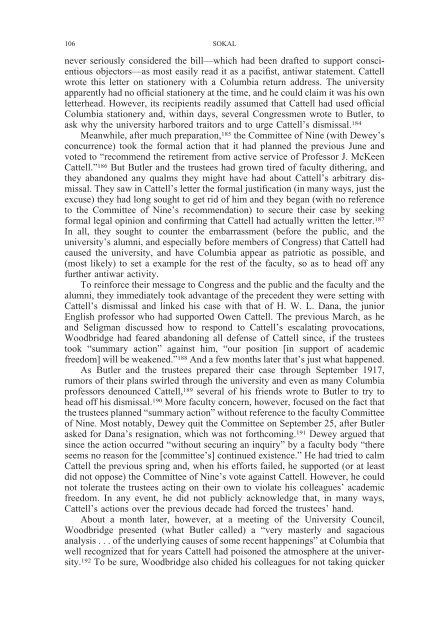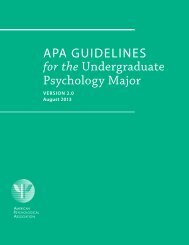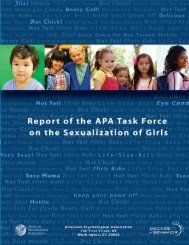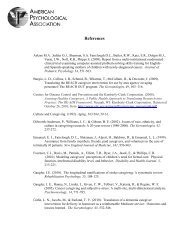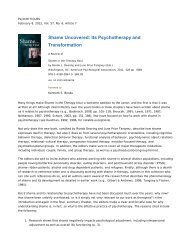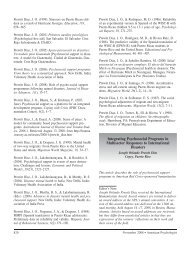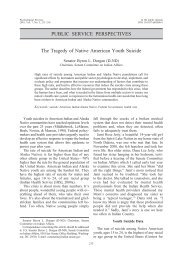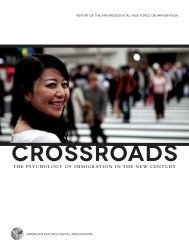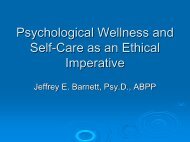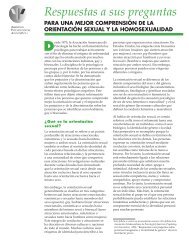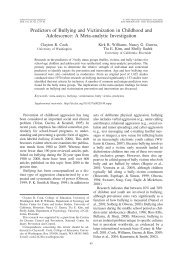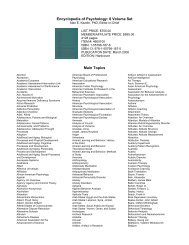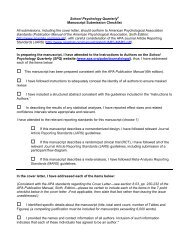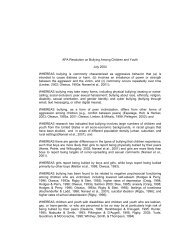James McKeen Cattell, Nicholas Murray Butler, and Academic ...
James McKeen Cattell, Nicholas Murray Butler, and Academic ...
James McKeen Cattell, Nicholas Murray Butler, and Academic ...
You also want an ePaper? Increase the reach of your titles
YUMPU automatically turns print PDFs into web optimized ePapers that Google loves.
106 SOKAL<br />
never seriously considered the bill—which had been drafted to support conscientious<br />
objectors—as most easily read it as a pacifist, antiwar statement. <strong>Cattell</strong><br />
wrote this letter on stationery with a Columbia return address. The university<br />
apparently had no official stationery at the time, <strong>and</strong> he could claim it was his own<br />
letterhead. However, its recipients readily assumed that <strong>Cattell</strong> had used official<br />
Columbia stationery <strong>and</strong>, within days, several Congressmen wrote to <strong>Butler</strong>, to<br />
ask why the university harbored traitors <strong>and</strong> to urge <strong>Cattell</strong>’s dismissal. 184<br />
Meanwhile, after much preparation, 185 the Committee of Nine (with Dewey’s<br />
concurrence) took the formal action that it had planned the previous June <strong>and</strong><br />
voted to “recommend the retirement from active service of Professor J. <strong>McKeen</strong><br />
<strong>Cattell</strong>.” 186 But <strong>Butler</strong> <strong>and</strong> the trustees had grown tired of faculty dithering, <strong>and</strong><br />
they ab<strong>and</strong>oned any qualms they might have had about <strong>Cattell</strong>’s arbitrary dismissal.<br />
They saw in <strong>Cattell</strong>’s letter the formal justification (in many ways, just the<br />
excuse) they had long sought to get rid of him <strong>and</strong> they began (with no reference<br />
to the Committee of Nine’s recommendation) to secure their case by seeking<br />
formal legal opinion <strong>and</strong> confirming that <strong>Cattell</strong> had actually written the letter. 187<br />
In all, they sought to counter the embarrassment (before the public, <strong>and</strong> the<br />
university’s alumni, <strong>and</strong> especially before members of Congress) that <strong>Cattell</strong> had<br />
caused the university, <strong>and</strong> have Columbia appear as patriotic as possible, <strong>and</strong><br />
(most likely) to set a example for the rest of the faculty, so as to head off any<br />
further antiwar activity.<br />
To reinforce their message to Congress <strong>and</strong> the public <strong>and</strong> the faculty <strong>and</strong> the<br />
alumni, they immediately took advantage of the precedent they were setting with<br />
<strong>Cattell</strong>’s dismissal <strong>and</strong> linked his case with that of H. W. L. Dana, the junior<br />
English professor who had supported Owen <strong>Cattell</strong>. The previous March, as he<br />
<strong>and</strong> Seligman discussed how to respond to <strong>Cattell</strong>’s escalating provocations,<br />
Woodbridge had feared ab<strong>and</strong>oning all defense of <strong>Cattell</strong> since, if the trustees<br />
took “summary action” against him, “our position [in support of academic<br />
freedom] will be weakened.” 188 And a few months later that’s just what happened.<br />
As <strong>Butler</strong> <strong>and</strong> the trustees prepared their case through September 1917,<br />
rumors of their plans swirled through the university <strong>and</strong> even as many Columbia<br />
professors denounced <strong>Cattell</strong>, 189 several of his friends wrote to <strong>Butler</strong> to try to<br />
head off his dismissal. 190 More faculty concern, however, focused on the fact that<br />
the trustees planned “summary action” without reference to the faculty Committee<br />
of Nine. Most notably, Dewey quit the Committee on September 25, after <strong>Butler</strong><br />
asked for Dana’s resignation, which was not forthcoming. 191 Dewey argued that<br />
since the action occurred “without securing an inquiry” by a faculty body “there<br />
seems no reason for the [committee’s] continued existence.” He had tried to calm<br />
<strong>Cattell</strong> the previous spring <strong>and</strong>, when his efforts failed, he supported (or at least<br />
did not oppose) the Committee of Nine’s vote against <strong>Cattell</strong>. However, he could<br />
not tolerate the trustees acting on their own to violate his colleagues’ academic<br />
freedom. In any event, he did not publicly acknowledge that, in many ways,<br />
<strong>Cattell</strong>’s actions over the previous decade had forced the trustees’ h<strong>and</strong>.<br />
About a month later, however, at a meeting of the University Council,<br />
Woodbridge presented (what <strong>Butler</strong> called) a “very masterly <strong>and</strong> sagacious<br />
analysis . . . of the underlying causes of some recent happenings” at Columbia that<br />
well recognized that for years <strong>Cattell</strong> had poisoned the atmosphere at the university.<br />
192 To be sure, Woodbridge also chided his colleagues for not taking quicker


